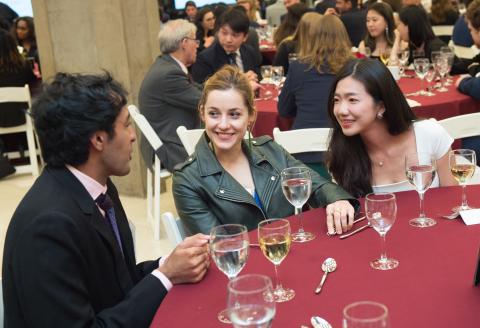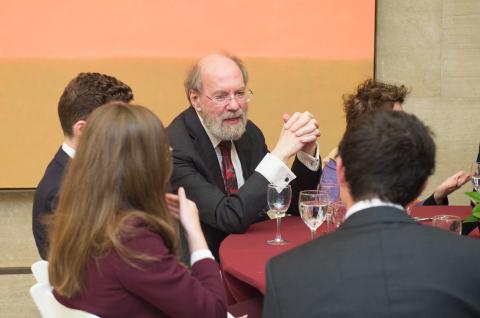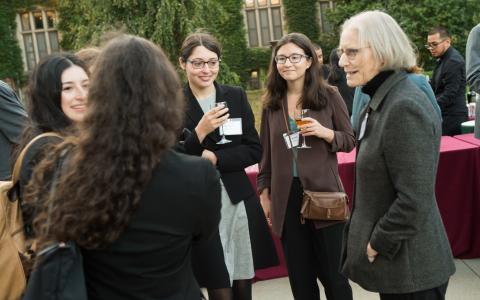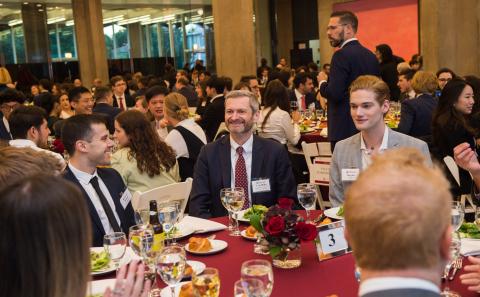‘Law School Really is Very Different than Middle School, Right? Wrong.’
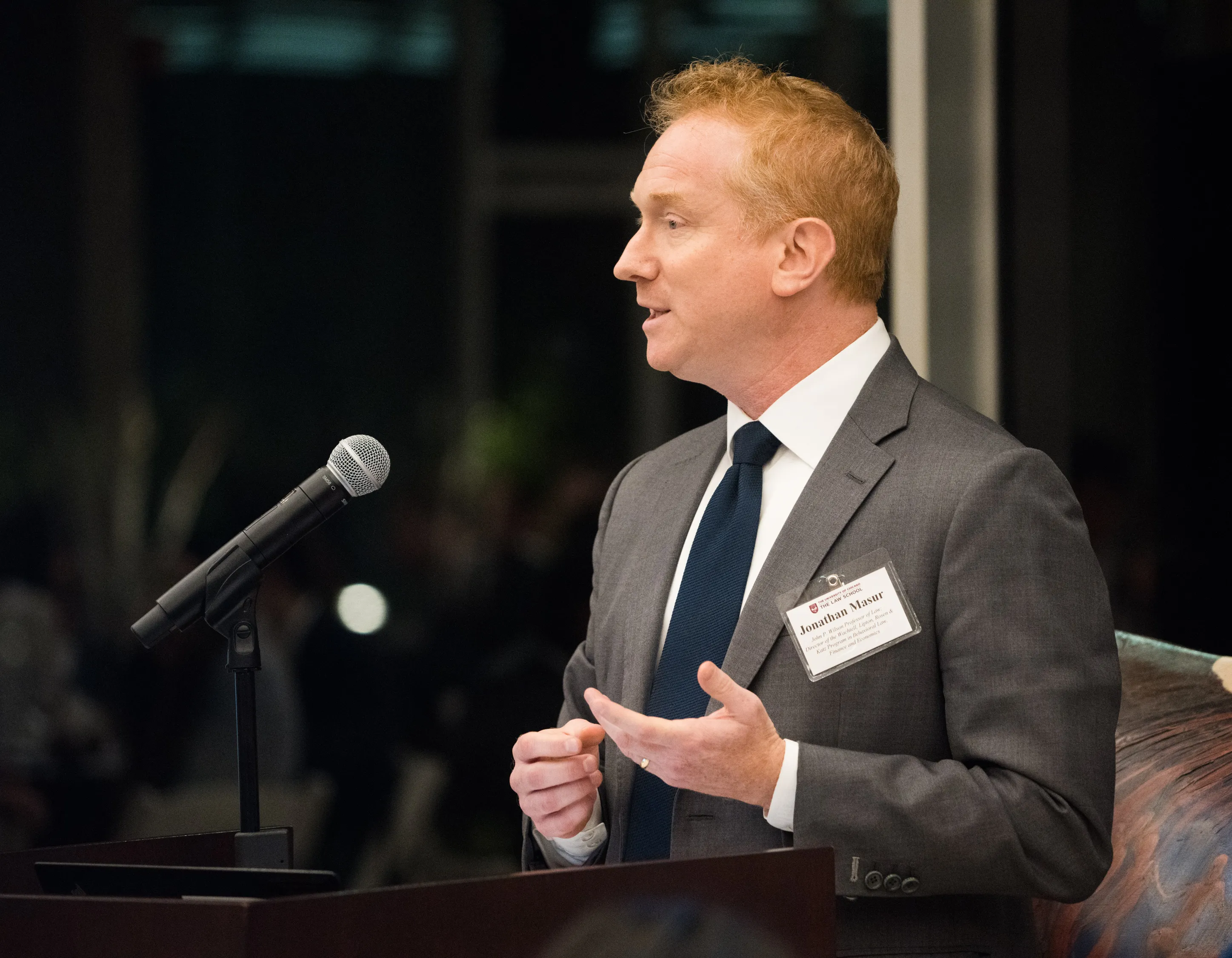
Thank you, Tom, for that very kind introduction. And let me be the 150th person to welcome the JD class of 2025 and the LLM class of 2023 to the University of Chicago Law School. You are about to embark upon an academic journey unlike anything you have experienced since middle school. Look, you’ve all been through Orientation, you’ve seen the building, you’ve looked at your course schedules. You’re going to be taking the same courses with the same people, each quarter, for the entire year. There are 15-minute passing periods between classes. You have lockers! During the passing periods, you’re going to elbow your way to your locker so you can put away the books from your last class and pull out the books for your next class. Starting to sound familiar? I suppose that in middle school you didn’t spend those passing periods talking about ex ante vs. ex post legal rules, or theories of causation, or the reasonable juror standard. Probably in middle school you weren’t self-consciously learning how to “think like a lawyer” either.
“How to think like a lawyer.” There is a rule that all Entering Students Dinner addresses must use the phrase “how to think like a lawyer” at least three times. I have now met my “how to think like a lawyer” quota—I’ve exceeded it, actually—which, to be honest, is pretty impressive for this early in the speech. I know that this phrase, “how to think like a lawyer,” sounds like it was devised by a marketing executive. It sounds like the sort of meaningless thing that law schools say to advertise themselves. You might be surprised to learn that the phrase actually has real meaning. And it is in fact what we do here, or at least it’s the principal thing that we do here. So what does it mean?
To think like a lawyer is to understand, when you are confronted with a legal question, what sorts of arguments you can make. What counts as a legitimate legal argument? What is the type of argument that a court is likely to entertain? What are the perspectives from which you can try to solve a legal problem or argue a legal case?
Part of this is about being able to recognize the ambiguities and uncertainties in legal questions. Forty years ago, two professors at what is now the fourth-ranked law school in the country wrote a best-selling book on negotiation strategy called Getting to Yes. Then, 20 years later, two law school professors wrote a book about how to do well on law school exams. The thesis of their book was that it was all about spotting the ambiguity in legal questions. The way to succeed on law school exams was to take a “on the one hand, on the other hand” approach to everything. These two professors had been students at that same fourth-ranked school 20 years earlier when Getting to Yes was being written, so they very cleverly called their book—you can probably guess it—Getting to Maybe. Instant bestseller. Maybe some of you have even bought and read this book already.
There’s something to their idea, but it’s woefully incomplete. Thinking like a lawyer means much more than understanding the ambiguities in legal questions. It means being able to evaluate the strengths and weaknesses of legal arguments. It means being able to predict which types of arguments will resonate more strongly or effectively in court. It means being able to solve problems, not merely notice (or create) them. Thinking like a lawyer means being able to get to “Correct” and “Incorrect,” or at least “Plausible” and “Implausible,” rather than just “Maybe.”
Of course, we also teach you civil procedure, and criminal law, and constitutional law, and tax law, and a variety of other legal subjects. And we hope those subjects will be useful to you! But we think teaching those subjects is valuable, not just in their own right, but because they’re vehicles for teaching you how to think like a lawyer.
So, that’s the substance of what we do here. And when it comes to understanding what law school really is, what this law school really is, the substance of what goes on is surely a lot more important than the fact that you have lockers, and passing periods, and take classes with all of the same people. So law school really is very different than middle school, right?
Wrong. Middle school is where one first learns to think like a lawyer. That’s not to say that middle schools teach it. It’s just hard to avoid. Think about the sorts of problems you had to navigate in middle school. I’m a little ways removed from middle school myself, but I have a proto-middle schooler at home, so I feel as though I have some insight into the middle school mind. And most of what they’re doing is fumbling toward thinking like a lawyer. Let me give you an example. Here's a conversation that I may or may not have recently overheard. The names of the people involved may or may not have been changed. The basic gist of things is that James, Malik, Bryson, and Graham are all friends. James, Malik, and Bryson were invited to a particular party; and Graham was not. James, Malik, and Bryson are debating whether they should tell Graham about the party.
Malik: We should tell him. He’s our friend, so he has a right to know what we’re doing. (Rights-based argument.)
James: No we shouldn’t. It’ll just make him upset. How is that good for him? Or for us? (Welfarist.)
Bryson: Last year we didn’t tell AJ [another friend] when we got invited to that party and he didn’t. So we don’t need to tell Graham. (Argument by analogy from precedent.)
Malik: We’re much better friends with Graham than with AJ. (Argument that precedent is disanalogous.)
Malik: There used to be a rule that we had to invite everyone in the class to our party. (Argument from statutory text.)
Bryson: That was never a rule for kids in our grade. (Argument from legislative silence.)
James: If we tell him, nobody will ever invite us to parties again. (Rational self-interest + consideration of incentives = law and economics!)
So there you go—thinking like a lawyer! (And not half-bad lawyers either.)
So this is part of my message to you tonight. You are not in fact embarking upon some new and unfamiliar journey that will be unlike anything you have ever encountered. You are embarking on three more years of school. During these three years, you will learn to reason in a way that will sometimes seem odd or unusual but will often seem intuitive and familiar. You’ll learn to do it rigorously, systematically, and with precision and acuity. Those are not words typically associated with middle schoolers! That’s how I know we’re adding value here.
It’s going to be challenging. But fundamentally, it’s still school. Everyone in this room is very good at school, or else you wouldn’t be in this room. You were probably all very good at middle school too, for that matter. You don’t need to reinvent yourselves to be here. Just keep doing all of the things that got you here in the first place. And in three short years, you’ll be qualified to advise James, Malik, and Bryson on what they should or should not tell Graham.
"During these three years, you will learn to reason in a way that will sometimes seem odd or unusual but will often seem intuitive and familiar. You’ll learn to do it rigorously, systematically, and with precision and acuity."
This is one big part of what it means to learn to think like a lawyer, but there’s another component to it as well. One of the big misconceptions about law school is that everyone thinks they’re coming here to learn the rules about what’s legal and what’s not legal. When has someone committed a crime, or when haven’t they. When is a contract valid, and when isn’t it. When have you committed a tort and when haven’t you. We think of these as primary rules of conduct: they tell you what the line is between allowable and prohibited actions. And indeed, a lot of law school is about figuring out the primary rules of conduct.
But lawyers, and in particular law professors and law students, also spend a great deal of time talking about the institutions that exist to write these rules and enforce them. We argue about whether rules should be decided at the state or federal level. We think about whether some question is best answered by a judge or a jury. We think about whether a dispute should be resolved through a lawsuit, or whether it makes more sense for Congress to pass a law. These are all institutional questions: which institution is best equipped to make the best decision about a contested question, all things considered. They’re sometimes also called “second-order” questions, to distinguish them from the “primary” rules of conduct. But they’re not of secondary importance. A lot of law school is about realizing how critical these types of questions are.
So what should we think about when we think about institutions? What makes for a good institution? Well, to be sure, it helps if an institution has good rules to govern it. And it certainly helps if the institution has strong norms and a healthy culture. But the thing to understand about institutions is that, at bottom, what matters most are the people in those institutions. And not just the people as individuals: the relationships between the people in the institution. They are the ones who set the norms and the culture. They are the ones who determine whether the institution will function well.
So let me conclude by talking for a moment about an institution I know well, and one that you will soon know well: this law school. The University of Chicago Law School is a well-functioning institution. And I don’t mean that our classes get taught on time, or that the Office of Career Services is good at helping people find jobs, though all of that is true. What I mean is that this is a place where people have built powerful, long-lasting relationships of trust with one another. Here, people treat one another with respect and generosity. This a place where people make arguments in good faith and for the right reasons, not to score points. It’s a place where people can disagree, even disagree vehemently about things that matter a lot, and are still able to talk to one another and work together the next day.
I know you’re thinking—what else am I going to say?!? I work here, obviously I think it’s a good institution. I want to stress one very important point to you: we already have your Fall Quarter tuition. We are no longer trying to sell you anything! My credibility should be at an all-time high.
So as I said, the foundation of our institution is a culture of trust: trust that the person next to you is your colleague, not your adversary, and that they see you the same way. Trust that they deserve the benefit of the doubt, and that they will give you the benefit of the doubt in return. I trust my faculty colleagues; I trust the JD students in the classes in the 2L and 3L classes; and I trust all of you in this room, even though I’ve only met a few of you.
How is it possible that I can trust you, and trust that you will uphold these high standards, even though I know very few of you? The reason is that there are two people at this law school who are infallible—two people who never make mistakes. First, I am required by the terms of my employment contract to say that my dean, Thomas J. Miles, has never erred. Tom, love this job, hope I can keep doing it! That’s one person. The other person who does not make mistakes is Ann Perry. If you are sitting in this room, you are meant to be here. You deserve to be here. You belong here. And it’s a good thing too, because we are all tethered together for life, through this institution.
So, the last thing I want to impress upon you is that you should all go out and start building the bonds of trust that you haven’t yet forged with one another. The bonds that you don’t yet have because, unlike me, you haven’t witnessed Ann Perry’s two-decade-long unbroken streak of perfection. Orientation is the first step in that process but certainly not the last. Get to know one another. Join student organizations. Play on intramural teams. Go to Coffee Mess. And Wine Mess. I’m barely qualified to give you legal advice and entirely unqualified to give you social advice, so I’m not going to, but I have heard that students sometimes even get together outside of this building! That seems like a good idea too. You should do that. This institution is about so much more than what happens in the classrooms. It’s about the relationships you’re going to build with one another. And the relationships you’re going to build with us, the faculty, as well.
I’m excited for all of you as you embark on this journey. I’m excited for myself and for all of my colleagues as we begin it alongside you. Welcome to the University of Chicago. I think you’re going to like it even more than middle school. Thank you.
